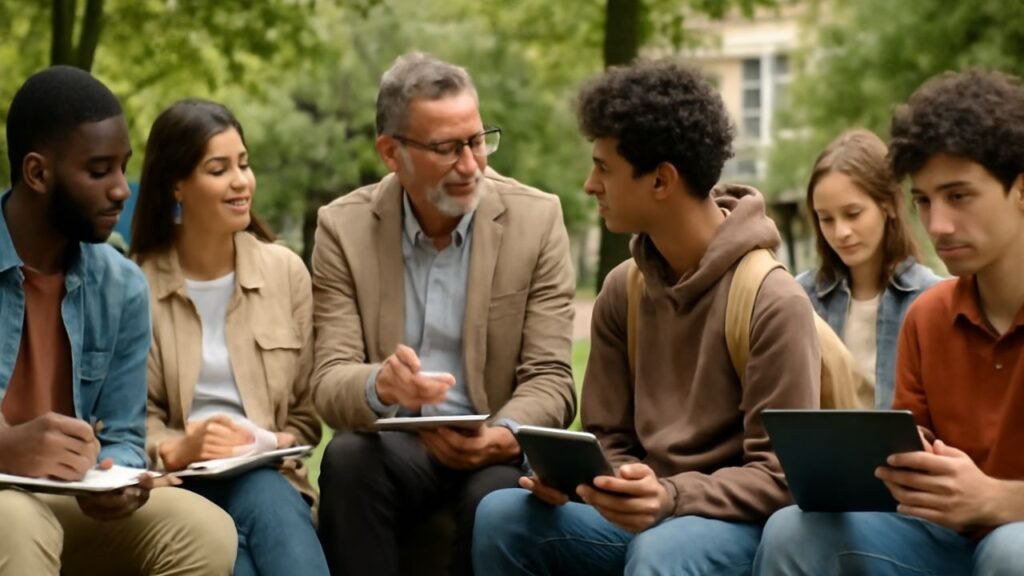SBS B.Ed. Curriculum – SBS B.Ed. Curriculum Highlights – Pedagogy, School Internship, Psychology, and Contemporary Issues is designed to provide aspiring teachers with a comprehensive foundation in both theoretical knowledge and practical skills. The curriculum balances core subjects, professional practice, and contemporary educational concerns to prepare graduates for dynamic classroom environments. At SBS B.Ed., students explore educational pedagogy that emphasizes effective teaching strategies, lesson planning, and assessment methods. Psychology courses focus on understanding student behavior, learning styles, and cognitive development, equipping future educators with the tools to foster a supportive learning environment. The school internship component provides hands-on experience in managing classrooms, designing teaching aids, and applying pedagogical principles under the mentorship of experienced teachers. Additionally, the curriculum addresses contemporary issues in education, such as inclusive learning, digital literacy, and environmental awareness, ensuring that graduates are prepared to handle the challenges of modern classrooms. By integrating theory, practice, and awareness of current educational trends, SBS B.Ed. cultivates competent, reflective, and adaptable teachers ready to contribute positively to the educational system.

Comprehensive Pedagogy and Instructional Strategies
Pedagogy forms the core of the SBS B.Ed. curriculum, focusing on the art and science of teaching. Students study methods such as lecture-based instruction, cooperative learning, project-based learning, and inquiry-driven teaching. These approaches are designed to enhance student engagement, critical thinking, and problem-solving abilities. SBS B.Ed. emphasizes the importance of lesson planning, classroom management, and formative assessment, ensuring that teacher trainees can design effective instructional strategies tailored to diverse student needs. Research highlights that pedagogical knowledge directly influences teaching effectiveness and student learning outcomes (Darling-Hammond et al., 2019). In addition to traditional techniques, trainees are exposed to technology-enhanced learning, including digital simulations, educational software, and interactive presentations, bridging the gap between conventional methods and modern classroom requirements. By mastering a wide range of pedagogical strategies, SBS B.Ed. graduates are equipped to deliver high-quality instruction and adapt teaching methods to varied educational contexts.
 Welcome to SBS B.Ed. College – Shaping Future Educators With Integrity, Excellence, and Innovation
Welcome to SBS B.Ed. College – Shaping Future Educators With Integrity, Excellence, and Innovation
School Internship and Practical Exposure
The school internship is a critical component of the SBS B.Ed. program, providing students with immersive, hands-on experience in real classroom settings. During internships, trainees observe and participate in teaching activities, manage classrooms, conduct assessments, and interact with students from different age groups and backgrounds. This practical exposure helps students apply theoretical knowledge in real-life situations, fostering confidence and professionalism. According to a study by the International Journal of Humanities and Social Science Research, internships significantly enhance teacher preparedness, instructional competence, and classroom management skills. Mentorship from experienced educators ensures that trainees receive continuous feedback and guidance, promoting reflective teaching practices. SBS B.Ed. also encourages students to design innovative teaching aids, integrate multimedia resources, and explore differentiated instruction techniques. By combining practical teaching with guided mentorship, the school internship program prepares graduates to face diverse classroom challenges and nurture holistic student development.
Psychology and Understanding Learner Behavior
A strong focus on psychology within the SBS B.Ed. curriculum equips future teachers with insights into human behavior, cognitive development, and socio-emotional growth. Courses such as educational psychology, child development, and learning theories help trainees understand how students acquire knowledge, process information, and respond to classroom environments. Knowledge of psychology enables teachers to identify learning difficulties, adapt instructional strategies, and promote a positive classroom climate. Research indicates that teachers with strong psychological understanding demonstrate higher effectiveness in student engagement, motivation, and performance (Zhang et al., 2019). SBS B.Ed. integrates psychological principles into practical sessions, allowing students to observe behavior, conduct assessments, and implement intervention strategies during school internships. By grounding teaching in psychological knowledge, SBS B.Ed. prepares educators to meet diverse learner needs and foster an inclusive, supportive, and motivating classroom environment.
 Explore the B.Ed. Program at SBS College – Duration, Subjects, Practical Training, and Evaluation
Explore the B.Ed. Program at SBS College – Duration, Subjects, Practical Training, and Evaluation
Addressing Contemporary Issues in Education
Modern classrooms require teachers to be aware of contemporary issues that influence learning and teaching. SBS B.Ed. incorporates topics such as inclusive education, environmental education, gender sensitivity, and digital literacy into the curriculum. Understanding inclusive practices ensures that teachers can accommodate students with varying abilities, backgrounds, and learning styles. Digital literacy training prepares educators to effectively use technology for instruction, assessment, and communication. Environmental and social awareness modules encourage teachers to promote sustainable practices and civic responsibility among students. According to research studies, addressing contemporary issues in teacher education enhances classroom relevance, student engagement, and holistic development. By integrating these topics into the B.Ed. curriculum, SBS B.Ed. ensures that graduates are not only skilled in pedagogy and psychology but also socially conscious, adaptable, and prepared to lead meaningful learning experiences in diverse educational contexts.


